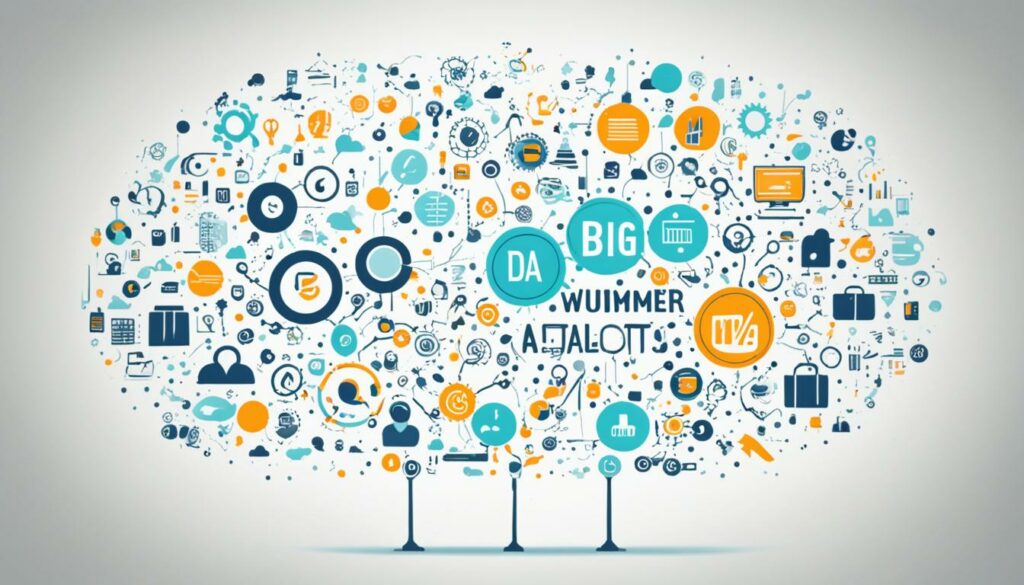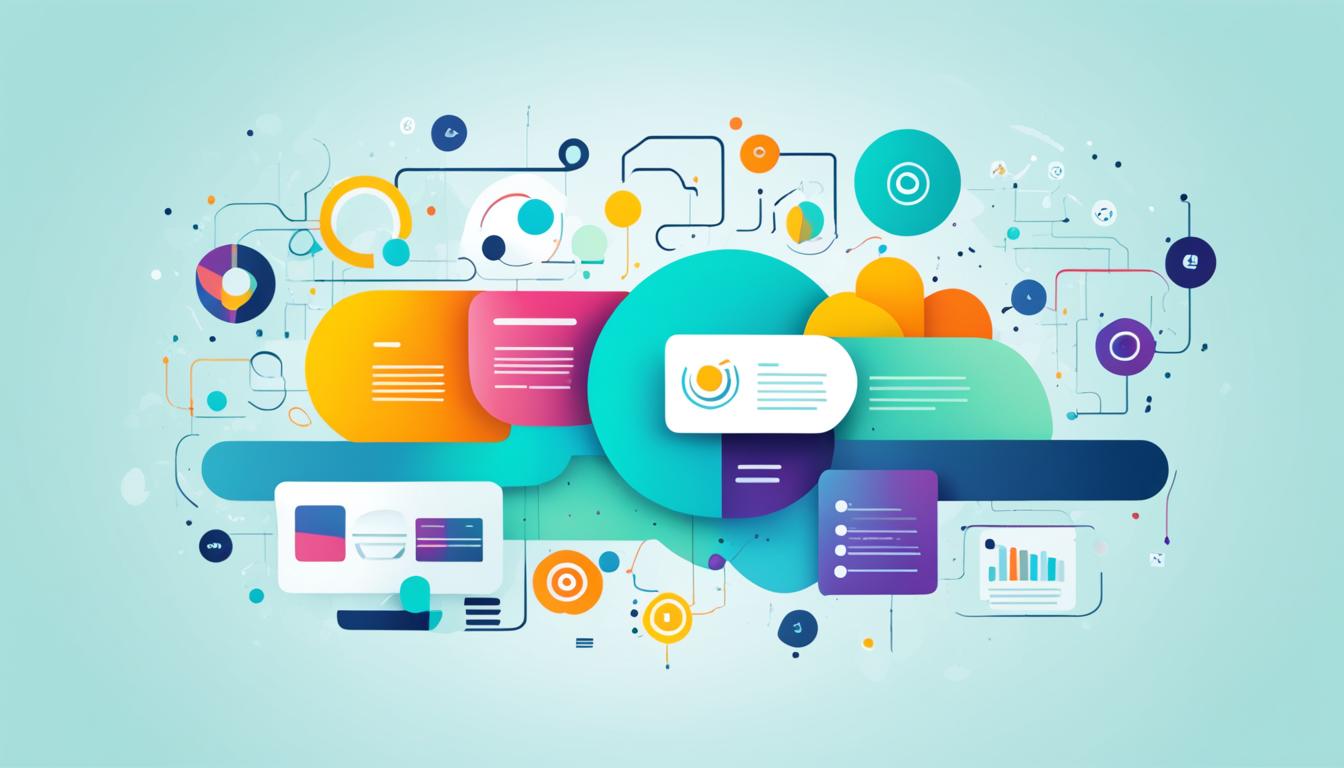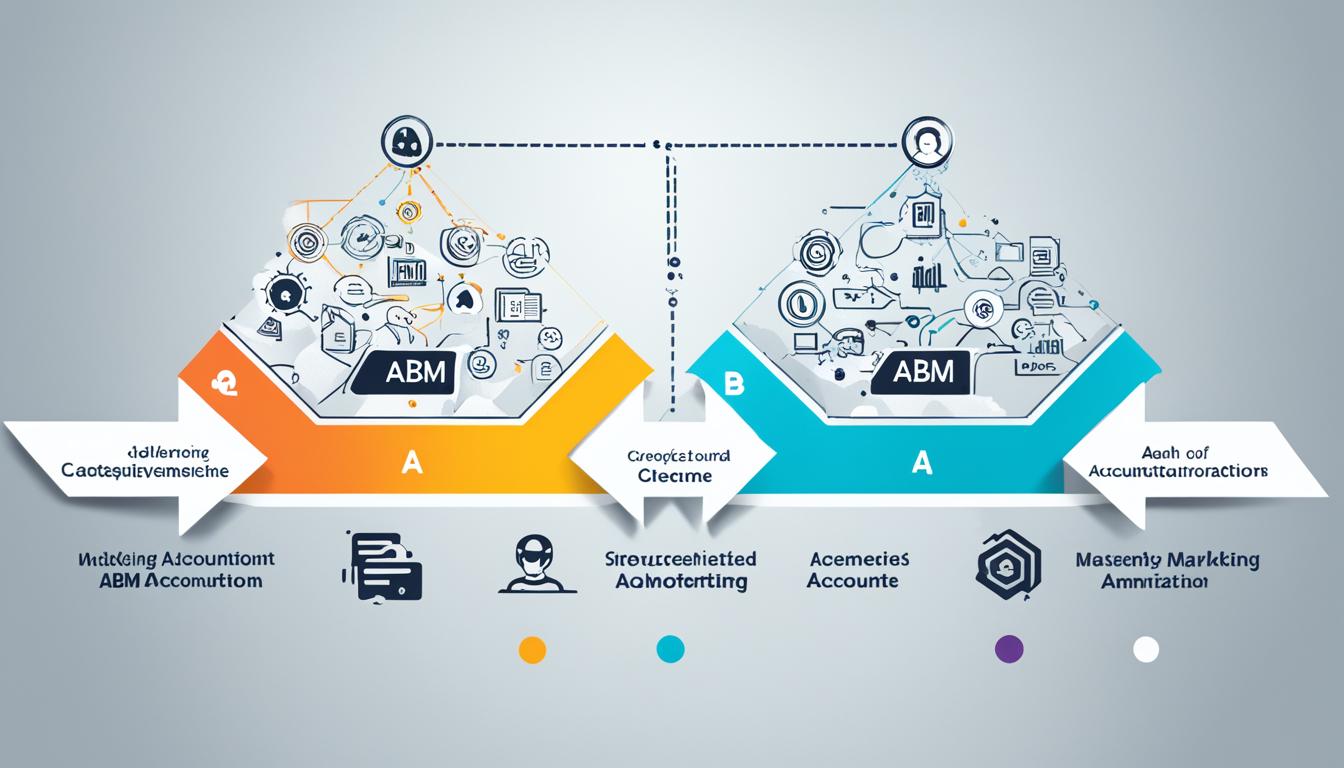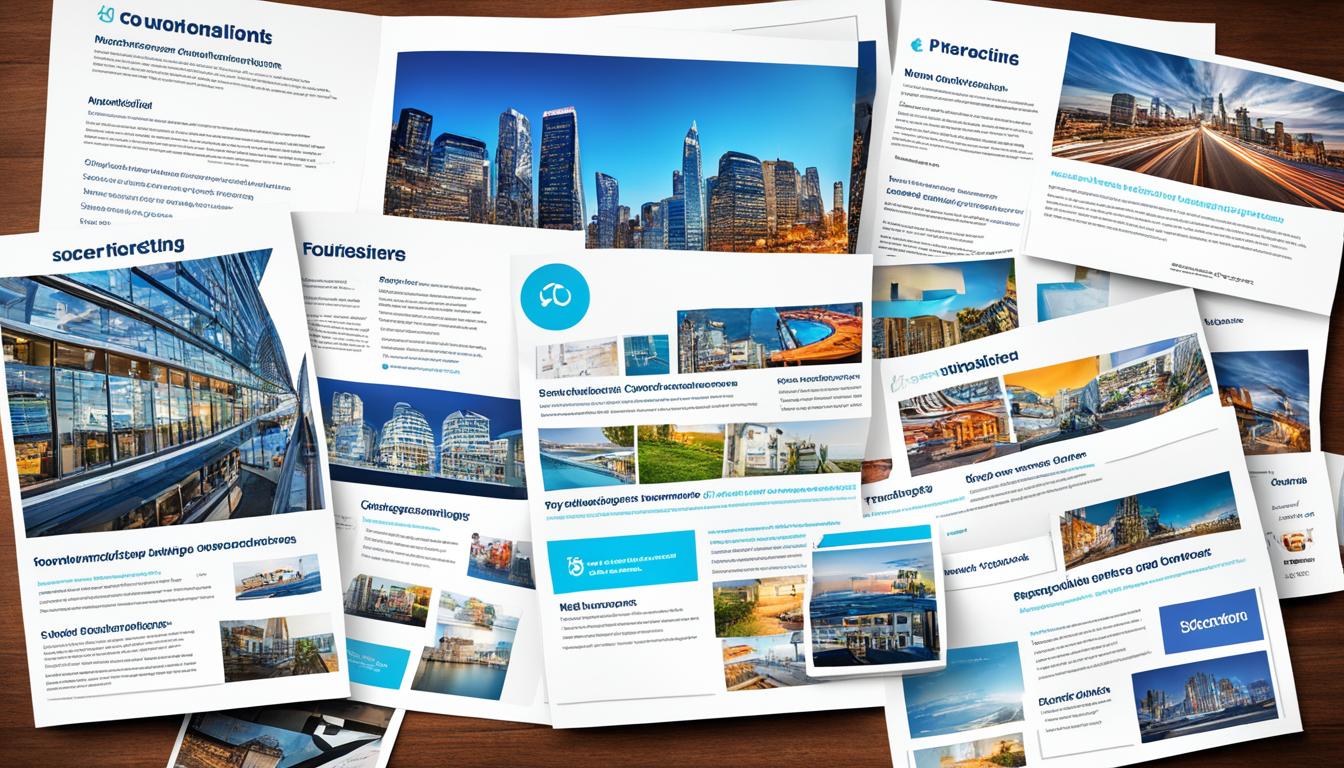Big Data has revolutionized the marketing landscape, providing companies with powerful insights and opportunities to enhance their strategies. By leveraging vast amounts of data, businesses can uncover new trends, improve customer experiences, and drive growth. In this article, we will explore real examples of how industry giants like Amazon, Marriott, Netflix, Uber Eats, McDonald’s, and Starbucks have successfully applied big data analytics in their marketing efforts.
Key Takeaways:
- Big Data enables businesses to identify new business opportunities and make data-driven marketing strategies.
- Companies like Amazon leverage Big Data for dynamic pricing and personalized product recommendations.
- Marriott hotels optimize pricing and enhance the customer experience using Big Data.
- Netflix’s success lies in its personalized content recommendations driven by customer data analysis.
- Uber Eats uses Big Data to optimize food delivery and provide a consistent customer experience.
Amazon’s Dynamic Pricing and Product Recommendations
Amazon, the world’s largest online retailer, utilizes Big Data to enhance the customer experience through dynamic pricing and personalized product recommendations. By leveraging data analysis, Amazon constantly adjusts its prices to optimize competitiveness and drive customer engagement.
Dynamic Pricing: Maximizing Competitiveness
Amazon’s dynamic pricing strategy involves changing prices up to 2.5 million times per day. This approach allows the company to respond swiftly to various factors such as competitors’ prices, product demand, and shopping patterns. By analyzing real-time data, Amazon can adapt its pricing strategy to stay competitive in the market and provide customers with the best possible deals.
Personalized Product Recommendations: Enhancing Customer Experience
Another way Amazon utilizes Big Data is through personalized product recommendations. By analyzing customer behavior, shopping history, and preferences, Amazon makes tailored suggestions to each individual based on their unique interests. This data-driven approach not only boosts customer satisfaction but also drives sales, with 35% of Amazon’s annual revenue attributed to these personalized recommendations.
In summary, Amazon’s implementation of Big Data in dynamic pricing and personalized product recommendations exemplifies how data analysis can enhance pricing strategies and improve the overall customer experience. By leveraging Big Data insights, Amazon continues to set the standard for customer-centric e-commerce.
Marriott’s Dynamic Pricing and Personalized Customer Experience
Marriott hotels, renowned for their exceptional customer service, utilize Big Data to optimize pricing and enhance the overall customer experience. One of the key strategies implemented by Marriott is dynamic pricing, where they adjust their rates based on various factors. These factors include the local and global economic situation, weather conditions, room availability, and even reservation behavior. Through meticulous analysis of these data points, Marriott has been able to achieve a significant 5% revenue increase per room.
In addition to dynamic pricing, Marriott leverages Big Data to revolutionize the check-in process. By implementing facial recognition technology, guests can now check-in without waiting in long reception lines. This innovative approach not only saves guests valuable time but also provides a seamless and personalized check-in experience.
Marriott further enhances the customer experience by utilizing Amazon Echos in guest rooms. These voice-activated devices gather data on guest preferences and personalize the in-room experience accordingly. From adjusting room temperature to playing customized music playlists, Marriott aims to create a truly tailored stay for each guest.
These exceptional strategies employed by Marriott exemplify how Big Data can be harnessed to optimize pricing and create an unparalleled customer experience in the hospitality industry. By analyzing data and implementing innovative technologies, Marriott continues to elevate its brand, making every stay a memorable one for its guests.
Netflix’s Personalized Content Recommendations
Netflix, the leading online streaming platform, owes its success to Big Data. With over 200 million subscribers worldwide, Netflix has mastered the art of personalized content recommendations, using customer data to deliver a tailored user experience that keeps viewers engaged and subscribed. By leveraging the power of Big Data analytics, Netflix has achieved an impressive 93% customer retention rate.
So, how does Netflix utilize Big Data to provide such accurate and relevant content recommendations? It all starts with a deep understanding of user behavior. By analyzing factors such as watch time, pausing, and resuming, Netflix creates unique profiles for each user, allowing them to curate personalized content suggestions.
Imagine you’ve just finished binge-watching a gripping crime series on Netflix. The next time you log in, you’re likely to see recommendations for similar crime dramas or other shows in the same genre. This personalized approach is what sets Netflix apart and keeps viewers coming back for more.
The Power of Personalization
Netflix’s personalized content recommendations not only enhance the user experience but also drive customer loyalty. When users feel that their preferences are understood and catered to, they are more likely to stay subscribed and continue enjoying the platform’s vast library of movies and shows.
But Netflix doesn’t stop at personalizing content recommendations based on past viewing habits. They are constantly looking for ways to enhance the user experience and further improve their recommendations. One exciting development in this area is the use of artificial intelligence (AI) to create personalized trailers.
Through AI-driven algorithms, Netflix plans to analyze individual preferences to craft trailers that resonate with each user’s unique taste. By delivering personalized trailers, Netflix aims to capture viewers’ attention right from the start and entice them to watch a new show or movie.
This focus on personalization not only benefits Netflix’s bottom line but also enhances the user experience by narrowing down the vast content library to recommendations that are most likely to interest each individual user.
The Impact of Personalization on Customer Retention
Netflix’s relentless pursuit of personalized content recommendations has paid off in terms of customer retention. By providing users with a seamless and tailored viewing experience, Netflix has created a loyal subscriber base that keeps coming back for more. This customer retention directly contributes to Netflix’s continued success and dominance in the streaming industry.
Furthermore, Netflix’s investment in Big Data analytics and personalized recommendations reflects a broader trend in the entertainment industry. As more streaming platforms emerge and compete for viewers’ attention, the ability to deliver personalized content recommendations will be a crucial factor in attracting and retaining subscribers.
| Benefits of Netflix’s Personalized Content Recommendations | Impact on Customer Retention |
|---|---|
| Enhanced user experience | 93% customer retention rate |
| Narrowing down vast content library | Increased customer satisfaction |
| AI-driven personalized trailers | Improved viewer engagement |
By leveraging the power of Big Data, Netflix has transformed the way viewers discover and consume content. Their personalized content recommendations not only keep viewers entertained but also contribute to a remarkable 93% customer retention rate. As the streaming landscape continues to evolve, personalized recommendations will remain a key differentiator for platforms vying for viewers’ attention.
Uber Eats’ Data-Driven Food Delivery
Uber Eats, a major player in the competitive food delivery market, relies on the power of Big Data to optimize its operations and deliver an exceptional customer experience. By collecting and analyzing vast amounts of data, Uber Eats can accurately predict the time of food delivery. This data-driven approach allows drivers to optimize their routes, maximizing efficiency by picking up multiple meals on their way.
But it doesn’t stop there. Uber Eats goes the extra mile by employing meteorologists and leveraging live weather data in their analysis. By considering weather conditions, they ensure that your food arrives while still warm and ready to be enjoyed.
This commitment to data analysis sets Uber Eats apart from its competitors and enables the company to provide a consistent and efficient food delivery service. With every order, Uber Eats leverages the power of Big Data to ensure a seamless and delightful experience for its customers.
Data-Driven Efficiency and Customer Satisfaction
Uber Eats’ data-driven approach not only benefits the company but also enhances the overall customer experience. By optimizing delivery routes and accurately predicting delivery times, Uber Eats minimizes delays and ensures that food arrives fresh and on time. This level of efficiency speaks directly to customer satisfaction, helping Uber Eats build a loyal customer base in the highly competitive food delivery industry.
Moreover, Uber Eats’ use of data analysis allows for continuous improvement of their delivery service. By analyzing customer feedback and delivery data, they identify areas for improvement and make data-informed decisions to enhance their operations. This iterative approach ensures that Uber Eats consistently meets and exceeds customer expectations.
With every delivery, Uber Eats leverages the power of Big Data to optimize its operations and provide a seamless and satisfying food delivery experience for customers across the globe.
McDonald’s Customization with Big Data
McDonald’s, a global fast food chain, understands the importance of catering to individual customer preferences. Through the use of Big Data analysis, McDonald’s has successfully implemented mass customization in response to changing consumer trends. By leveraging data insights, McDonald’s optimizes its drive-thru menus, ensuring that customers see relevant products based on factors such as the time of day, weather conditions, and historical sales data.
This customization strategy not only enhances the customer experience but also aligns with the growing trend of healthy living and online ordering. By analyzing customer behaviors and preferences, McDonald’s can offer personalized menu items that appeal to a wide range of tastes and dietary requirements. Whether it’s providing vegetarian options, gluten-free alternatives, or low-calorie choices, McDonald’s ensures that every customer can find something suitable for their needs.
With the increasing popularity of online ordering and delivery services, McDonald’s has also utilized Big Data to improve its digital offerings. By analyzing customer data, McDonald’s can tailor its online ordering platform to provide a seamless and personalized experience. From suggesting popular menu items to recommending add-ons based on previous orders, McDonald’s leverages data analysis to enhance convenience and customer satisfaction.
McDonald’s exemplifies how Big Data enables companies to adapt and meet the evolving preferences of their customers. Through customization, McDonald’s has successfully forged deeper connections with its customer base and positioned itself as a leader in the fast-food industry.
Benefits of McDonald’s Customization Strategy:
- Enhanced customer experience through personalized menu options
- Alignment with changing consumer trends, such as healthy living and online ordering
- Increase in customer satisfaction and loyalty
- Improved digital offerings for seamless online ordering and delivery
- Expanded customer base through catering to diverse dietary requirements
McDonald’s customization strategy serves as a prime example of how data analysis and Big Data insights can revolutionize the fast-food industry, allowing companies to stay relevant and meet the ever-changing demands of their customers.
Starbucks’ Personalized Offers and Customer Insights
Starbucks, a global brand, leverages Big Data to deliver personalized offers and gain valuable customer insights. They use data analysis to tailor product recommendations to individual customers based on their preferences and purchase history. By analyzing customer feedback from various channels, they extract meaningful insights to improve their offerings. Starbucks’ data-driven approach enhances customer engagement and increases customer satisfaction.
Big Data Revolutionizing Marketing and Sales
Big Data is transforming the landscape of marketing and sales in various industries. Its applications are diverse and impactful, ranging from improving the quality of sales leads to enhancing customer relationships. Let’s explore some of the key use cases of Big Data in marketing and sales:
1. Customer Analytics
Big Data enables businesses to gain valuable insights into customer behavior and preferences, helping them develop targeted marketing strategies and personalized experiences. By analyzing large volumes of customer data, such as purchase history, online interactions, and social media activity, companies can identify patterns, trends, and opportunities to optimize their marketing efforts and drive business growth.
2. Operational Analytics
Operational analytics leverages Big Data to improve operational efficiency and effectiveness in marketing and sales. By analyzing various operational factors, such as supply chain management, inventory levels, and sales performance, businesses can identify areas for improvement and make data-driven decisions. This enables companies to streamline processes, reduce costs, and enhance overall performance in marketing and sales operations.
3. Sales Leads Optimization
Big Data plays a crucial role in enhancing the quality of sales leads by utilizing predictive analytics. By analyzing customer data, market trends, and historical sales patterns, businesses can identify potential customers with a higher likelihood of converting into sales. This allows sales teams to prioritize leads effectively, increasing the efficiency of prospecting and maximizing sales conversion rates.
4. Pricing Strategy Optimization
One of the significant advantages of Big Data in marketing and sales is the ability to optimize pricing strategies. By analyzing market dynamics, competitor pricing, and customer demand patterns, businesses can dynamically adjust prices to maximize revenue and profitability while remaining competitive. This data-driven approach ensures that businesses offer the right prices to the right customers at the right time.
5. Enhanced Customer Relationships
Big Data enables businesses to build stronger and more personalized relationships with their customers. By analyzing customer data, businesses can deliver personalized recommendations, offers, and experiences that cater to individual preferences. This level of personalization creates a deeper connection with customers, enhances their satisfaction, and fosters customer loyalty.
Overall, the use of Big Data in marketing and sales has significantly revolutionized how businesses approach these functions. With its applications in customer analytics, operational analytics, sales leads optimization, pricing strategy optimization, and customer relationship enhancement, Big Data offers valuable insights and opportunities for businesses to drive growth and gain a competitive edge in the market.
Use Cases of Big Data in Marketing and Sales
| Use Case | Description |
|---|---|
| Customer Analytics | Analyze customer data to gain insights into behavior and preferences, optimizing marketing strategies and personalized experiences. |
| Operational Analytics | Analyze operational factors to improve efficiency and effectiveness in marketing and sales operations. |
| Sales Leads Optimization | Utilize predictive analytics to enhance the quality of sales leads, prioritize prospects, and maximize conversion rates. |
| Pricing Strategy Optimization | Analyze market dynamics, competitor pricing, and customer demand patterns to optimize pricing strategies. |
| Enhanced Customer Relationships | Deliver personalized recommendations, offers, and experiences to build stronger customer relationships. |

Sources:
Insert the sources here.
The Role of Big Data in AI-Driven Marketing
Big Data plays a critical role in AI-driven marketing, as AI applications require large datasets to train their algorithms. By harnessing the power of Big Data, AI-powered tools such as Jasper and Viable are able to generate human-like content and analyze customer feedback for meaningful insights.
With the integration of Big Data and AI technologies, marketers can greatly improve customer responsiveness and automate various processes. The abundance of data allows AI algorithms to better understand customer preferences, behaviors, and trends, enabling marketers to deliver highly personalized and targeted campaigns.
Moreover, the combination of Big Data and AI enhances digital strategies and optimizes marketing performance. Marketers can leverage AI algorithms to analyze vast amounts of data and extract actionable insights, helping them make data-driven decisions and drive sales growth.
To visualize the impact of Big Data in AI-driven marketing, consider the following table:
| Benefits of Big Data in AI-driven Marketing | Examples |
|---|---|
| Improved Customer Responsiveness | Incorporating AI chatbots that use Big Data to provide instant and relevant customer support. |
| Enhanced Personalization | Utilizing Big Data to analyze customer behavior and preferences, enabling personalized product recommendations. |
| Automated Campaign Optimization | Implementing AI algorithms that analyze Big Data to optimize marketing campaigns in real-time. |
| Optimized Marketing Performance | Using AI-powered tools to analyze Big Data and extract actionable insights for targeted marketing strategies. |
As you can see, Big Data in AI-driven marketing revolutionizes the way businesses approach their marketing efforts, leading to improved customer experiences, increased efficiency, and better overall results.
By leveraging the power of Big Data and AI, marketers can stay at the forefront of marketing technology and drive their businesses towards success in the ever-evolving digital landscape.
The Impact of Big Data on Marketing Reporting and Automation
Big Data has revolutionized marketing reporting by enabling automated data collection and analysis. With the power of Big Data, marketers can now track campaign performance in real-time and quickly identify any issues or areas of improvement through automated dashboards. This enhanced visibility allows for timely adjustments to marketing strategies, resulting in better outcomes.
One of the key benefits of Big Data in marketing reporting is the ability to analyze large volumes of data. Marketers can gather data from various sources, such as social media platforms, website analytics tools, and customer relationship management (CRM) systems. By leveraging advanced data analysis techniques, marketers can extract actionable insights that drive decision-making and optimize marketing campaigns.
To streamline the process of data gathering and reporting, there are tools available like Improvado and Klaviyo. These tools provide marketers with comprehensive reporting solutions, allowing them to visualize and interpret data in a user-friendly interface. Marketers can customize reports, create visualizations, and automate the generation of reports, saving time and effort.
By harnessing the power of Big Data in marketing reporting, businesses can achieve improved efficiency and effectiveness in their campaigns. Real-time data tracking and analysis enable marketers to make data-driven decisions and quickly adapt their strategies based on the insights gained. This dynamic approach to marketing reporting helps businesses stay competitive in an ever-changing market landscape.
Additionally, automation plays a crucial role in marketing reporting. With Big Data, marketers can automate the collection, processing, and reporting of data, reducing the need for manual intervention and minimizing the risk of human error. This automation streamlines the reporting process, allowing marketers to focus on analysis and strategy development rather than tedious data management tasks.
Automation also enables real-time reporting, providing marketers with up-to-date and accurate insights into campaign performance. With automated dashboards and reporting systems, marketers can access key metrics and performance indicators instantly, facilitating timely decision-making and proactive marketing actions.
Benefits of Big Data in Marketing Reporting and Automation:
- Real-time tracking of campaign performance
- Quick identification of issues and areas for improvement
- Ability to analyze large volumes of data
- Extract actionable insights for data-driven decision-making
- Comprehensive reporting solutions with tools like Improvado and Klaviyo
- Streamlined and automated data collection and reporting processes
- Reduced manual intervention and minimized human error
- Access to real-time and accurate insights for informed decision-making
By leveraging the power of Big Data in marketing reporting and automation, businesses can unlock valuable insights, optimize their marketing strategies, and drive better results. As the availability and importance of data continue to grow, marketers who embrace Big Data will be at the forefront of innovation and effective marketing practices.
Conclusion
The utilization of Big Data has become an indispensable tool in marketing, revolutionizing strategies, personalization, and decision-making. Through examples like Amazon, Marriott, Netflix, Uber Eats, McDonald’s, and Starbucks, we have witnessed how industry giants leverage Big Data to optimize pricing, enhance customer experiences, and deliver personalized recommendations. These success stories showcase the significant impact of Big Data in marketing, driving business growth and improving marketing strategies.
Moreover, Big Data has transformed marketing reporting and automation, empowering marketers to access real-time data and streamline their processes. With automated data collection and analysis, marketers can track campaign performance, identify issues, and extract actionable insights through comprehensive reporting solutions. Big Data has enhanced the efficiency and effectiveness of marketing campaigns, enabling businesses to make data-driven decisions and stay ahead in the digital age.
In conclusion, the integration of Big Data in marketing has proven to be a game-changer, providing numerous opportunities for businesses to thrive and succeed. It has facilitated strategies that optimize pricing, improve customer experiences, and deliver personalized recommendations. Additionally, Big Data has revolutionized marketing reporting and automation, enabling real-time data access and streamlining processes. As the world continues to generate vast amounts of data, harnessing the power of Big Data in marketing will be crucial for businesses to stay competitive and achieve sustainable growth.
FAQ
What are some examples of big data in marketing?
Companies like Amazon, Marriott, Netflix, Uber Eats, McDonald’s, and Starbucks have successfully implemented big data in their marketing efforts. They use big data to optimize pricing, improve customer experiences, deliver personalized recommendations, and gain valuable customer insights.
How does Amazon use big data in marketing?
Amazon uses big data to improve the customer experience by implementing dynamic pricing. They change their prices based on factors like shopping patterns, competitors’ prices, and product popularity. Amazon also utilizes customer data to provide personalized product recommendations.
How does Marriott leverage big data in marketing?
Marriott adjusts their rates based on factors like the local and global economic situation, weather, availability, and reservation behavior. They also use big data to enhance the customer experience by implementing facial recognition check-ins and gathering data through Amazon Echos in guest rooms.
How does Netflix use big data in marketing?
Netflix leverages customer data to provide personalized content recommendations. They analyze user behavior and create personalized accounts for each consumer. Netflix plans to further personalize content by using AI to create trailers tailored to individual preferences.
How does Uber Eats utilize big data in their operations?
Uber Eats collects and analyzes data to predict the time of food delivery accurately. They optimize routes for drivers and consider weather conditions to ensure food is delivered while still warm. This data-driven approach sets them apart in the competitive food delivery market.
How does McDonald’s use big data for customization?
McDonald’s uses big data to optimize their drive-thru menus by displaying relevant products based on factors like time of day, weather, and historical sales data. This customization aligns with current consumer trends and enhances the customer experience.
How does Starbucks utilize big data for personalized offers?
Starbucks analyzes customer data to tailor product recommendations to individual customers based on their preferences and purchase history. They also extract meaningful insights from customer feedback to improve their offerings and increase customer satisfaction.
What are some use cases of big data in marketing and sales?
Big data is used to increase the quality of sales leads, improve prospecting list accuracy, optimize pricing strategies, enhance customer relationships, and drive new product development and enterprise data warehouse optimization.
What is the role of big data in AI-driven marketing?
Big data plays a critical role in AI-driven marketing, as AI applications require large datasets to train their algorithms. Big data fuels the development of AI technologies in marketing, improving customer responsiveness, automating processes, and driving sales growth.
How does big data impact marketing reporting and automation?
Big data enables automated data collection and analysis, allowing marketers to track campaign performance in real-time and quickly identify issues through automated dashboards. Tools like Improvado and Klaviyo streamline data gathering and offer comprehensive reporting solutions, improving the efficiency and effectiveness of marketing campaigns.
What is the impact of big data on marketing?
Big data has revolutionized marketing by providing opportunities to optimize strategies, personalize customer experiences, and make data-driven decisions. It has become an indispensable tool for businesses to grow and succeed in the digital age.






